
“Never wake a sleeping baby” — this golden rule has been whispered among exhausted parents for generations. But what if everything you’ve been told about your baby’s sleep is actually sabotaging your family’s rest?
The peaceful face of your slumbering infant might be irresistible, but sometimes, that gentle wake-up call is exactly what your baby needs.
From establishing crucial feeding patterns to preventing those dreaded 3 AM party sessions, strategic waking can be your secret weapon.
When should you break this sacred parenting commandment? When is it actually beneficial to disturb those angelic naps?
Learn the game-changing situations in which waking your baby isn’t just acceptable—it’s the expert-recommended approach that could change your family’s sleep routine forever.
Understanding Baby Sleep Patterns
Babies have very different sleep patterns from adults. Newborns sleep 14-17 hours daily but in short bursts of 2-3 hours, with no clear day-night schedule. By 3-6 months, many babies start sleeping longer at night and take regular naps during the day.
Their sleep cycles are shorter than adults—about 50-60 minutes compared to our 90 minutes.
Babies also spend more time in REM (Rapid Eye Movement) sleep, which helps their rapidly developing brains. This explains why they often twitch, smile, or seem restless while sleeping.
Every baby is unique in their sleep needs and patterns. Some naturally sleep longer stretches earlier, while others take more time to develop longer sleep periods. What matters most is that your baby seems well-rested and happy when awake.
When Waking Your Baby Makes Sense?
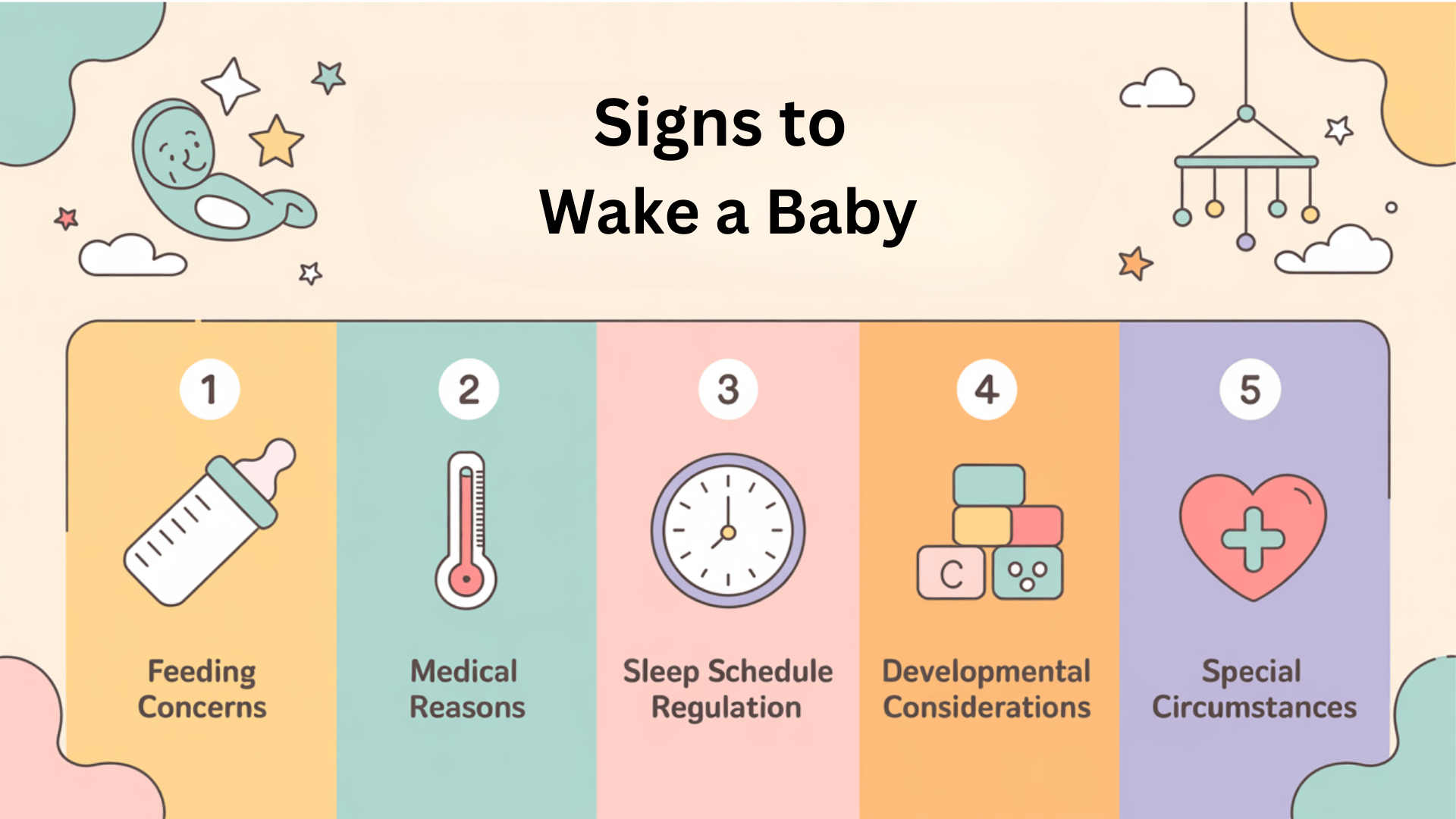
While “never wake a sleeping baby” is common advice, there are important situations when waking your baby is beneficial or necessary.
1. Feeding Concerns
Newborns need to eat frequently—typically every 2-3 hours—to support rapid growth and development. For breastfed babies, these regular feedings also help establish milk supply.
If your newborn is sleeping through feeding times, particularly in the first few weeks, gently wake them to maintain this crucial schedule.
2. Medical Reasons
Babies with jaundice require regular feeding to help eliminate bilirubin through bowel movements. Your doctor may recommend waking your baby every 2-3 hours until jaundice levels decrease.
If your baby needs medication at specific times, waking them ensures consistent treatment. Follow your healthcare provider’s guidance on timing, especially for antibiotics or other time-sensitive medications.
3. Sleep Schedule Regulation
Newborns often confuse day and night. Waking them after 2-3 hours of daytime sleep helps establish circadian rhythms. Exposure to natural light during these wake periods further reinforces day/night distinction.
Sometimes, a too-late afternoon nap can interfere with bedtime. Waking your baby from a late nap (after 4-5 p.m. for many babies) can protect nighttime sleep and prevent bedtime battles.
4. Developmental Considerations
Babies need awake time for physical, cognitive, and social development. Excessively long stretches of sleep might limit opportunities for tummy time, interaction, and skill development.
During growth spurts (typically around 2-3 weeks, 6 weeks, 3 months, and 6 months), babies may need additional calories. Waking for an extra feeding can support these high-energy developmental periods.
5. Special Circumstances
Premature babies often have different feeding and sleep needs. Follow your NICU team’s guidance, which typically includes more frequent wakings for feeds until your baby reaches their due date or meets specific growth targets.
Babies with reflux or digestive issues may need to be kept upright after feeding, which might mean waking them if they fall asleep during or immediately after eating.
When Not to Wake Your Baby
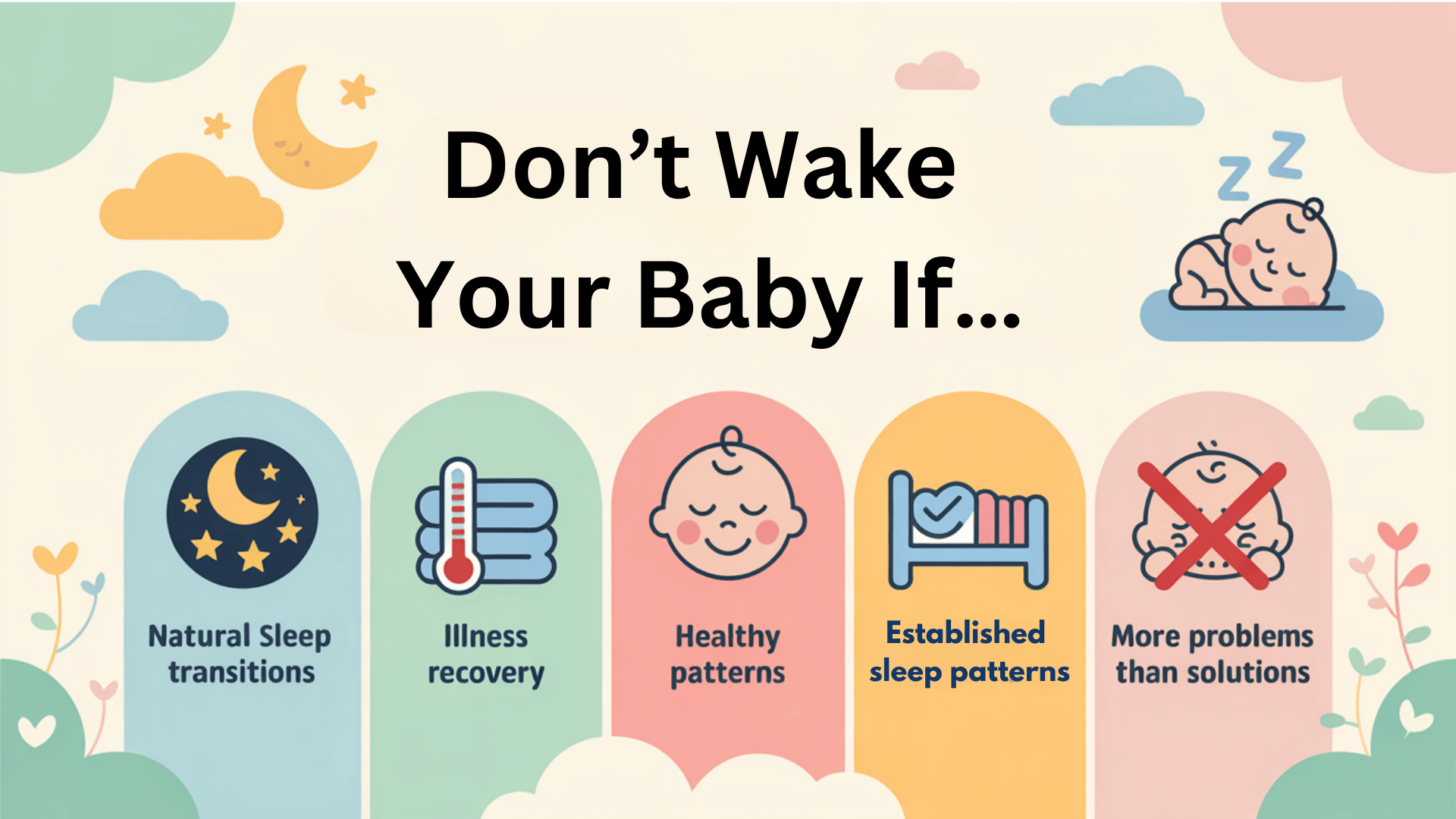
While there are legitimate reasons to wake a sleeping baby, there are also many situations where it’s best to let your little one sleep. Knowing when to intervene and when to step back can help you make confident decisions about your baby’s sleep.
1. Natural Sleep Transitions
During sleep cycles, babies naturally shift between light and deep sleep. You might notice your baby stirring, making small movements, or even briefly opening their eyes during these transitions.
Resist the urge to pick them up or interact immediately—these movements are normal and don’t necessarily indicate they’re ready to wake up. Letting babies adjust on their own helps them self-soothe and sleep longer.
2. During Illness Recovery
When babies are fighting off infections or recovering from illness, they often need extra sleep. Sleep is healing—it allows their immune system to work effectively and allows their bodies to direct energy toward recovery rather than activity.
Unless your pediatrician has advised waking for medication or hydration checks, allow your sick baby to sleep as needed. Their increased sleep requirement is typically temporary and serves an important purpose in helping them get well.
3. When Sleep Patterns Are Healthy
If your baby is growing appropriately, reaching developmental milestones, feeding well during wake times, and generally seems happy and healthy, its sleep patterns are likely working for it—even if they differ from what books or other parents describe as “normal.”
Some babies naturally sleep longer stretches while others sleep less but more frequently. As long as the overall sleep quantity is appropriate for their age and they’re thriving.
4. After Establishing Good Sleep Habits
Once your baby has developed healthy sleep patterns and no longer needs night feedings (usually around 4-6 months with pediatrician approval), waking them during normal nighttime sleep becomes unnecessary.
At this stage, consistent bedtimes and wake times become more important than the occasional extra-long nap or sleep stretch.
5. When It Creates More Problems Than Solutions
Sometimes, waking a sleeping baby leads to crankiness, difficulty returning to sleep, and stress for both the baby and the parents.
If attempts to adjust your baby’s schedule by waking them consistently result in an overtired, fussy baby, the intervention may be causing more harm than good. In these cases, a more gradual approach to schedule adjustments is often more successful.
How to Wake a Baby Gently
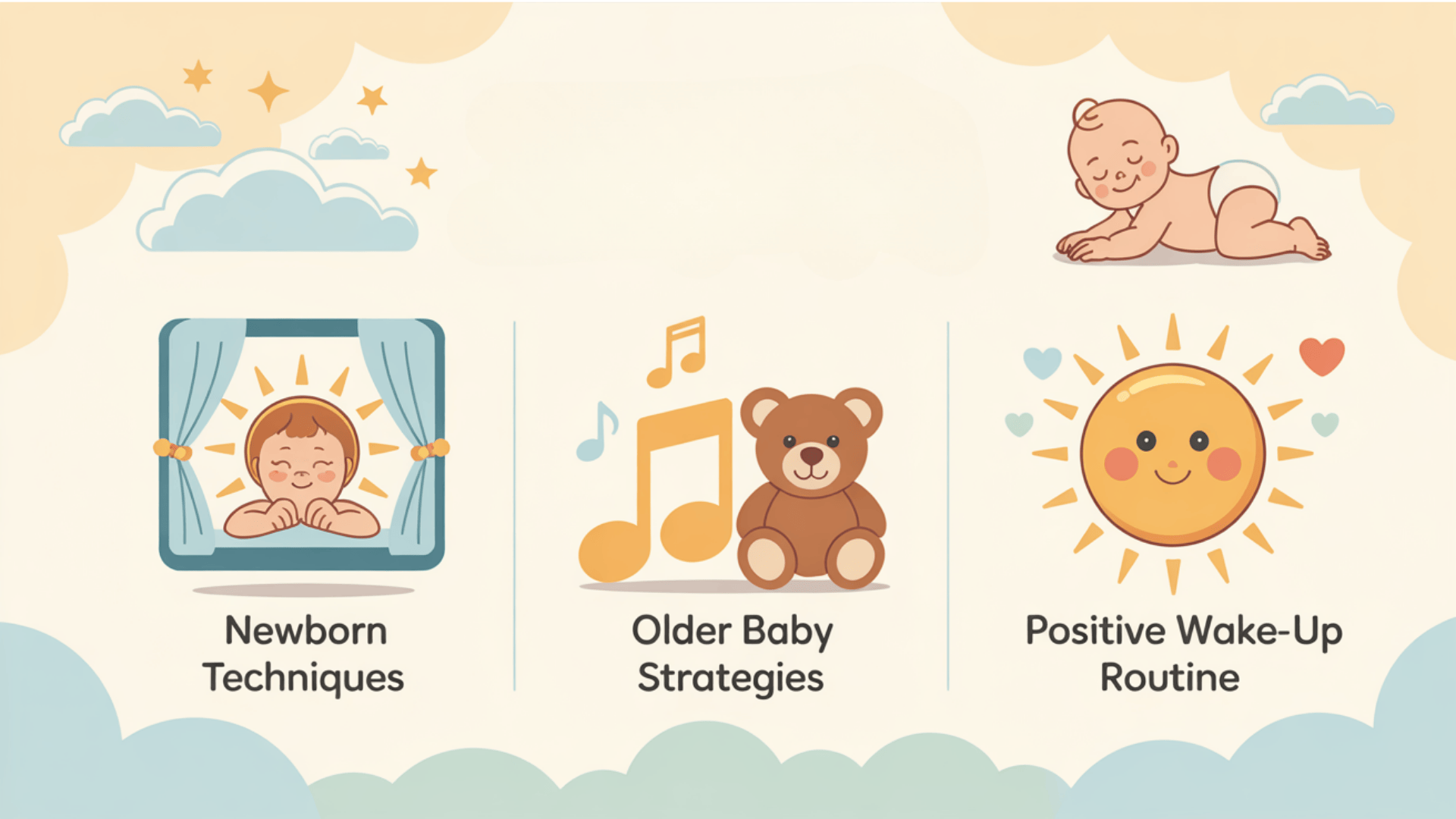
Waking a sleeping baby requires patience and gentle techniques that ease the transition from sleep to wakefulness, minimizing tears and crankiness.
1. Techniques for Newborns
Start by changing the environment slightly—open blinds to let in natural light or remove a light blanket. Gently unwrap a swaddled baby or change its diaper. If these subtle approaches don’t work, try skin-to-skin contact, speaking softly to your baby, or lightly stroking their cheeks or hands.
2. Strategies for Older Babies
With older infants, try singing softly, playing gentle music, or bringing a favorite toy into view. Sit beside their crib and speak in an upbeat, morning voice before picking them up. Some babies respond well to gentle movement, like lightly bouncing the mattress.
3. Creating a Positive Wake-up Routine
Establish a consistent wake-up routine with positive associations. Open curtains, say a special good morning phrase, and give cuddles before starting the day. Making wake-up time pleasant helps babies transition more easily from sleep to wakefulness.
Age-Specific Sleep Guidelines: When to Wake Your Baby or Toddler
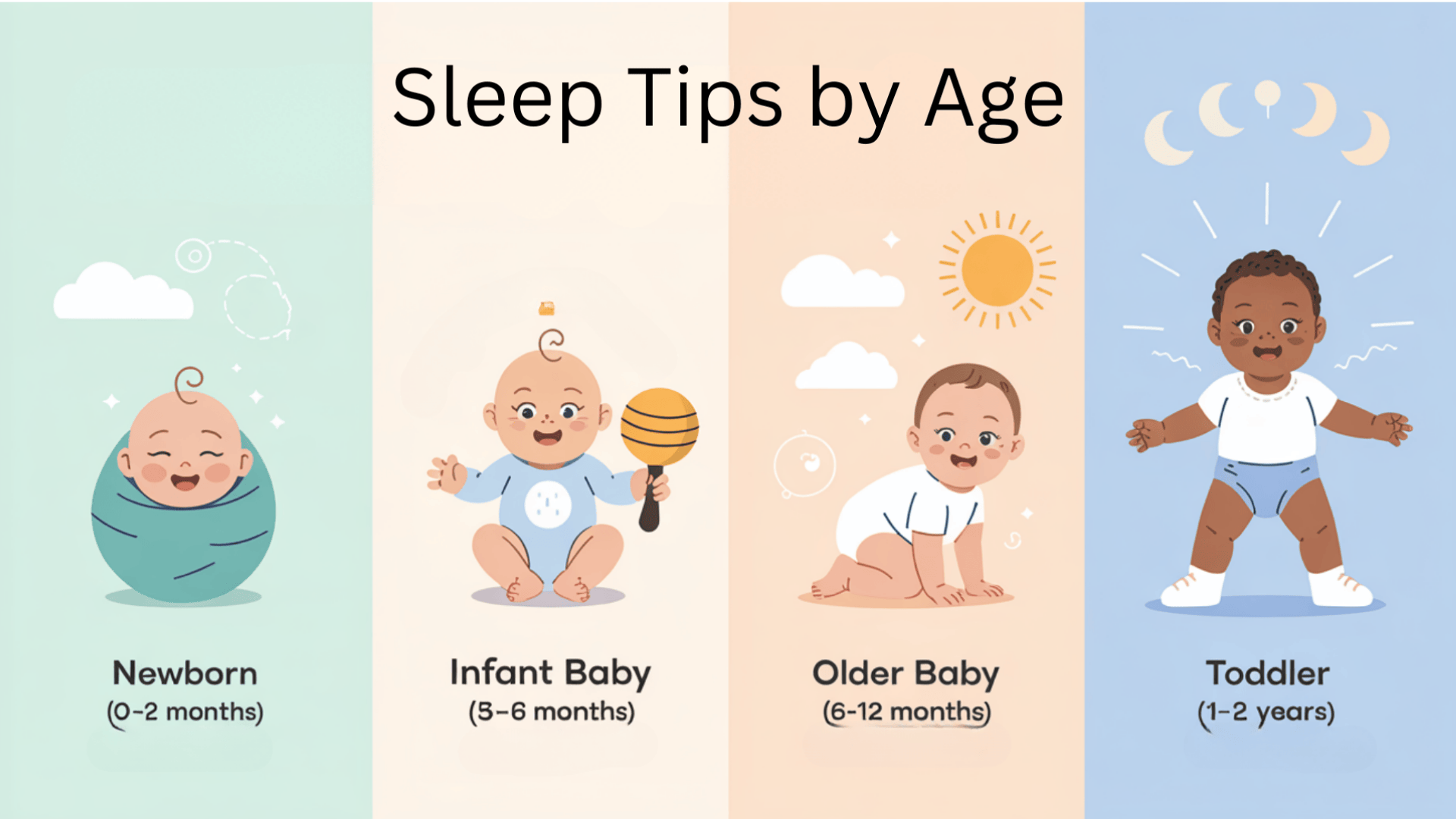
As your child grows, their sleep patterns change. While getting enough rest is essential, there are times when gently waking them supports better overall sleep habits and daily routines.
Use this quick guide to know when it’s appropriate to wake your baby or toddler based on their age.
Sure! Here’s the table with the “Wake If…” content rewritten as brief 2–3 line paragraphs for each age group:
| AGE GROUPS | SLEEP NEEDS | WAKE IF… |
|---|---|---|
| Newborns (0–3 mo) | 14–17 hrs/day (short bursts) | Wake your newborn if it has slept more than 3 hours during the day or 4–5 hours at night without clearance. Also, wake if it needs medication or shows signs of jaundice. |
| Infants (3–6 mo) | 12–15 hrs/day | Wake your baby if naps exceed 2–2.5 hours, if they nap after 5 PM, or if they show signs of day-night confusion or inconsistent sleep. |
| Babies (6–12 mo) | 12–14 hrs/day (2–3 naps) | Wake if naps last over 2.5 hours, if a third nap is too late in the day, or if any nap happens after 4 PM. Irregular wake times also signal a need to adjust. |
| Toddlers (1–3 yrs) | 11–14 hrs/day (1 nap) | Wake if the nap exceeds 3 hours or happens after 4 PM. Also consider waking if they rise too early following a long nap or if the daily schedule seems off. |
Finding Balance: Sleep Training and Waking Considerations
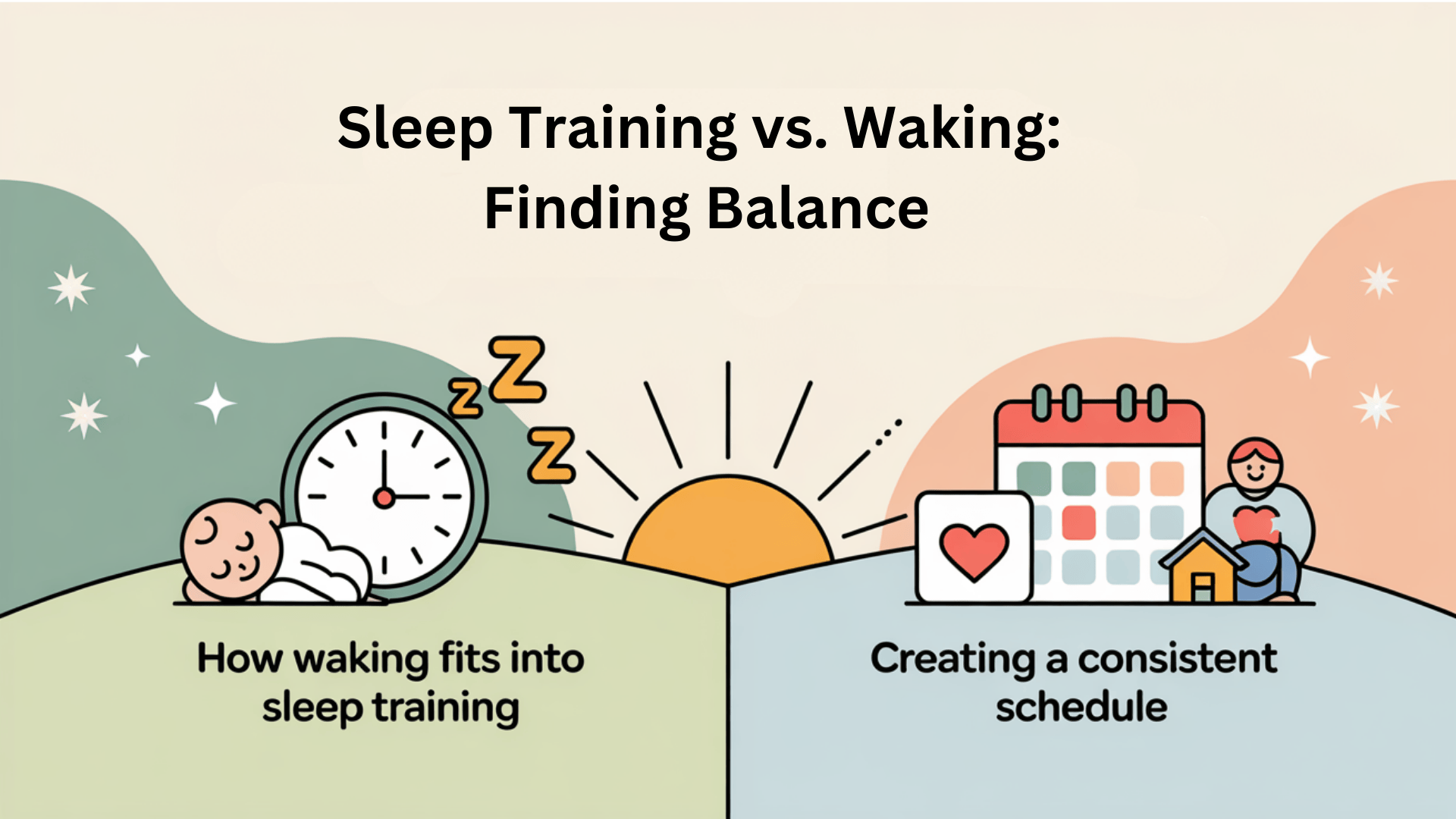
Waking can play a helpful role in sleep training when used thoughtfully.
While most methods emphasize independent sleep, strategic waking—such as setting a consistent morning wake time or limiting naps to age-appropriate lengths—can reinforce healthy sleep habits and prevent overtiredness.
Some approaches even include “wake to sleep,” where a baby is gently roused before they typically stir, helping them connect sleep cycles more smoothly.
The key is creating a consistent schedule that fits your family’s lifestyle, balancing work routines, sibling needs, and your baby’s natural rhythms.
Start with a set morning wake time and adjust naps and bedtime based on age-appropriate wake windows.
When to Consult a Pediatrician About Sleep Concerns

Contact your pediatrician if your baby shows excessive sleepiness, is difficult to wake, or has significantly decreased wet diapers. Sudden, dramatic changes in established sleep patterns also warrant medical attention.
Signs requiring immediate consultation include loud snoring, gasping, or noticeable pauses in breathing during sleep, which may indicate sleep apnea.
Persistent sleep issues despite consistent routines, night terrors, or unusual sleep behaviors should be evaluated professionally.
If sleep challenges are severely impacting your family’s functioning or your baby seems chronically overtired despite your best efforts, your pediatrician can provide personalized guidance based on your baby’s health history.
Parting Words
Ultimately, the decision to wake a sleeping baby comes down to balancing expert guidelines with your parental instincts. While research provides valuable frameworks, you know your child best.
Remember that every baby is different. Some infants naturally develop regular sleep patterns, while others need more guidance to establish healthy rhythms. What works for one family may not work for yours.
The real goal isn’t following rigid rules but developing healthy sleep habits that benefit your entire family. Sometimes, this means letting your baby sleep; other times, a gentle wake-up supports their overall sleep development.
Trust yourself. With time and observation, you’ll recognize when to let your little one dream on and when a wake-up serves their best interests. This balance creates well-rested babies and well-rested parents—and that’s what matters most.
If you’re interested in more informational content on mothers and babies, feel free toclick here and explore other blogs that you might enjoy.
